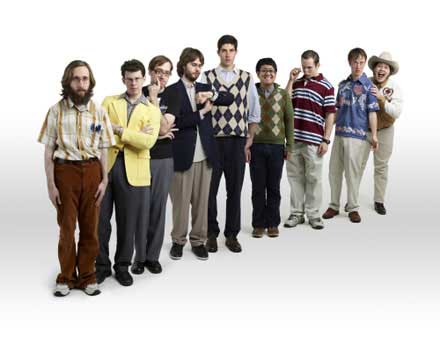 |
|
File photo of a group of "geeks". Move over, high school quarterback. The geek is the new cool kid in town. |
|
Move over, high school quarterback. The geek is the new cool kid in town. According to a new study presented by information technology company Modis in honor of Geek Pride Day, one in six Americans considers himself or herself a geek, and a whopping 57 percent believe being called a geek is a compliment. Americans most closely associate the term "geek" with favorable attributes such as being extremely intelligent (45 percent), a reliable source for technology advice (56 percent) and a first adopter of technology (45 percent), according to a phone survey of 1,000 American adults. However, perhaps one of the most interesting findings that supports this point is that nearly twice as many Americans would prefer to be called a “geek” (41 percent) rather than a "jock" (22 percent). Of the people surveyed by the Opinion Research Group for Modis' study, 17 percent said they were geeks. The results pointed to a cultural shift in the way Americans perceive geeks. While two-thirds of "Millennials," the age 18-34 demographic group, think being identified as a geek is a compliment, only 39 percent of respondents who are 65 and older agree. Eighty-two percent of the respondents feel it is more acceptable to be a geek today than it was 15 years ago. "It might be Americans' increasing dependence on and comfort with technology, or the prevalent images of former 'geeks' who now successfully lead multibillion-dollar technology companies, but being a geek has gone mainstream," said Jack Cullen, president of Modis. At the same time, the survey showed self-identified geeks are not as fond of the label "nerd." Eighty-seven percent of them say they were more comfortable being called a geek than a nerd. Survey respondents feel the professional fields best-suited for geeks are video game designer (65 percent), technology engineer (50 percent) and professional blogger (37 percent). (Read by Nelly Min. Nelly Min is a journalist at the China Daily Website.) (Agencies)
|
讓位吧,高中橄欖球隊四分衛,現在城里的新派酷哥是“極客”。 據Modis信息科技公司的最新調查,六分之一的美國人認為自己是“極客”,另有多達57%的受訪者認為被稱為“極客”是一種贊美。該調查旨在紀念“極客節”。 美國人最愛將“極客”和某些優點聯系起來,比如45%的受訪者認為“極客”非常聰明、能提供正確的技術建議(56%)、是新技術的嘗鮮者(45%)。共有一千名美國成年人接受了調查。 但能支持這一論點的一個最有趣的發現是,愿意被稱為“極客”的美國人(41%)是愿意被稱為“運動健將”的美國人(22%)的兩倍。 在Modis公司委派市場研究集團進行的這項調查中,17%的受訪者自稱“極客”。 調查結果表明,美國人看待“極客”的方式出現了文化轉變。三分之二的“千年一代”,也就是年齡在18歲至34歲之間的群體,認為被稱為“極客”是一種贊美。而在65歲及以上的受訪者中,僅有39%的人對此表示贊同。 82%的受訪者認為,與15年前相比,而今“極客”更被大家所接受。 Modis公司總裁杰克?卡倫說:“這也許是因為美國人越來越依賴科技,對科技、以及那些前‘極客’的普遍形象更有好感了。這些人如今成功領導著價值數十億美元的科技公司。但如今做個‘極客’已經成為主流。” 調查同時表明,自稱“極客”的人們卻不喜歡被叫做“電腦迷”。 87%的受訪者稱,自己更喜歡被稱為“極客”而不是“電腦迷”。受訪者認為最適合“極客”的專業領域是“電腦游戲設計師”(65%)、科技工程師(50%)和專業博主(37%)。 相關閱讀 (中國日報網英語點津 Julie 編輯: 馮明惠) |
|
Vocabulary: move over: 挪開,讓位 quarterback:(橄欖球)四分衛 geek: 極客,在美國俚語中意指智力超群,善于鉆研但不懂與人交往的學者或知識分子,含有貶義,因為極客常常醉心于自己感興趣的領域,可以犧牲個人衛生,社交技巧或社會地位。 但近年來,隨著互聯網文化興起,其貶義的成分正慢慢減少。 但這個詞仍保留了擁有超群的智力和努力的本意,又通常被用于形容對計算機和網絡技術有狂熱興趣并投入大量時間鉆研的人。所以俗稱發燒友或怪杰。如電腦怪杰(Computer Geek),技術/科技怪杰(Techno-geek ),玩家怪杰(gamer geek)等。 put something to rest: 平息,使停止 jock: 運動員;愛好體育的男子(或男孩) nerd: 電腦迷,乏味的人 |
